Register for OsintifyCON

Have Questions? Call us!
Tel: +230 214 2687
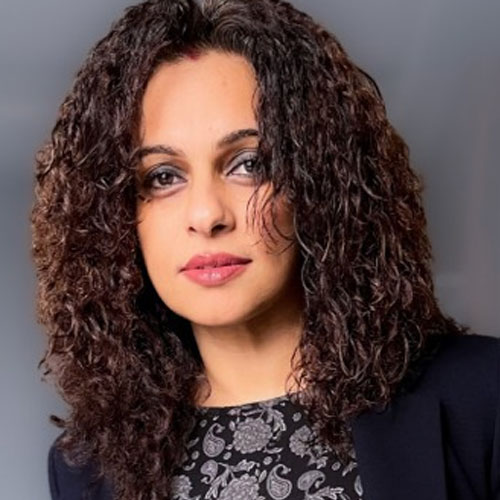
Dr. Sheeba Armoogum
Cyberpsychology and Social Engineering
Dr. Sheeba Armoogum holds a PhD in Cybersecurity and is an Associate Professor in the Department of ICT at the University of Mauritius (UoM). She is a globally respected Cybersecurity Architect with over 20 years of expertise spanning academia, applied research, digital policy, and high-level governance. She also serves as an Independent Non-Executive Director at Rogers Capital Technology, where she advises on digital resilience, cybersecurity strategy, and AI ethics.
Dr. Sheeba has advanced cybersecurity innovation through two landmark patents filed and issued by the South African Patent Office. She is also the sole inventor of “An Extended Genetic Technique Based Intrusion Detection and Prevention System” (WIPO Classification H04L), commercially referred to as CyberThreat DNA. She is the co-inventor of “AI-Driven Ethical Governance System and Method for Unified Cyber Threat Intelligence and Digital Forensics Incident Response” (WIPO Classification G06F), a next-generation platform that unifies CTI (Cyber Threat Intelligence) and DFIR (Digital Forensics Incident Response). The system emphasises scalability, automation, and ethical compliance, offering proactive threat prediction and bias-mitigated forensic decision-making. At the University of Mauritius, Dr. Sheeba leads the CyberSecurity & Forensics Research Group (CSFRG), supervises PhD research in cybersecurity, cyberpsychology, and AI, and publishes extensively in high-impact Q1 and Q2 journals. A former Head of Department and a national Subject Specialist in Cybersecurity, she is also deeply engaged in digital literacy outreach, ethical technology advocacy, and international cyber governance.
Cyberpsychology and Social Engineering
Cyberpsychology and Social Engineering intensive 4-hour training delves into the cognitive and behavioural mechanisms exploited in social engineering attacks within cybersecurity contexts. It covers advanced psychological theories related to persuasion, influence, and decision-making biases that adversaries leverage to manipulate individuals and bypass technical defenses. Participants will analyse sophisticated social engineering techniques, including phishing, pretexting, baiting, and deepfake exploitation, supported by case studies from recent cyber incidents. The course also emphasises practical detection strategies, risk assessment methodologies, and the design of effective countermeasures to mitigate human-factor vulnerabilities in organisational security frameworks.

Sam Tilston
DNS Deep Dive: Advanced Techniques for Intelligence Gathering
Sam Tilston is a seasoned cybersecurity expert and entrepreneur with over 20 years of experience in the tech industry. He is the founder of Effect Group, a London-based company specializing in open-source intelligence (OSINT) platforms designed to streamline information gathering and enhance strategic planning for businesses and organizations
Certified as an ethical hacker and a Microsoft Certified Systems Engineer, Sam has been at the forefront of internet technology since its early days. His work focuses on developing systems and platforms that aim to maximize social impact, political benefit, and economic potential . Through Effect Group, Sam continues to innovate in the realm of open-source intelligence, providing tools that empower organizations to make informed decisions in an increasingly complex digital world.
Advanced Domain Name Intelligence involves leveraging comprehensive analysis of domain registration data, DNS traffic patterns, historical domain information, and reputation scoring to detect and mitigate cyber threats such as phishing, malware distribution, and domain spoofing. By combining open-source intelligence, machine learning algorithms, and threat intelligence feeds, this approach enables real-time identification of malicious domains and protects brand integrity, supports fraud detection, and informs strategic business decisions. As digital threats evolve, integrating AI and automated processes enhances the accuracy and speed of domain intelligence, making it an essential tool for cybersecurity professionals and organizations seeking to safeguard their online presence and assets.
As digital threats grow more complex and widespread, this intelligence capability is essential for cybersecurity professionals and organizations seeking to safeguard their online presence, protect customer trust, and maintain regulatory compliance. It provides a proactive defense layer that strengthens overall security posture and resilience against sophisticated cyberattacks.

Jessica Chuah
Crystal Expert UTXO Investigator (CEUI)
Jessica joined Crystal in March 2024, bringing with her a dynamic portfolio of experience in emerging technologies across the ASEAN region. Her career has spanned a range of roles at the intersection of fintech, compliance, and digital innovation, with a particular focus on initiatives such as e-wallet platforms that enable cross-border wire transfers, payroll automation, and remittance services. Jessica holds an LL.B (Honours) from the University of London and is a Fellow of the Association of Chartered Certified Accountants (FCCA). She is also an ASEAN Chartered Professional Accountant (ASEAN CPA) and a Certified Anti-Money Laundering Specialist (CAMS), underscoring her strong foundation in regulatory compliance and financial integrity within complex, fast-evolving digital ecosystems. Her multidisciplinary expertise positions her as a key contributor to Crystal’s growth in regulated and technology-driven markets.
Crystal Expert UTXO Investigator (CEUI) is designed for professionals investigating Bitcoin and other UTXO-based blockchains like Litecoin and Bitcoin Cash. It focuses on the core principles of UTXO analysis and practical application through Crystal Expert. Participants must first complete and pass the Crystal Crypto Fundamentals course before enrolling. The training begins with an overview of Bitcoin fundamentals and the structure of UTXO-based blockchains. Students learn key tracing techniques, including the identification of change outputs and heuristic-based analysis. The course includes instruction on how to enhance blockchain investigations using OSINT resources. Practical case studies demonstrate how to apply theory within the Crystal Expert platform. Emphasis is placed on building strong analytical skills tailored to UTXO transactions. Learners will gain the ability to conduct structured, compliant blockchain investigations. The course bridges foundational knowledge with investigative practice using both Crystal and external tools.

Jessica Chuah
Crystal Expert Crypto Fundamentals
Jessica joined Crystal in March 2024, bringing with her a dynamic portfolio of experience in emerging technologies across the ASEAN region. Her career has spanned a range of roles at the intersection of fintech, compliance, and digital innovation, with a particular focus on initiatives such as e-wallet platforms that enable cross-border wire transfers, payroll automation, and remittance services. Jessica holds an LL.B (Honours) from the University of London and is a Fellow of the Association of Chartered Certified Accountants (FCCA). She is also an ASEAN Chartered Professional Accountant (ASEAN CPA) and a Certified Anti-Money Laundering Specialist (CAMS), underscoring her strong foundation in regulatory compliance and financial integrity within complex, fast-evolving digital ecosystems. Her multidisciplinary expertise positions her as a key contributor to Crystal’s growth in regulated and technology-driven markets.
Crystal Expert Crypto Fundamentals is an introductory course for professionals new to crypto, blockchain, and Web3. It offers a clear, structured overview of blockchain technology, consensus mechanisms, and how blocks are built. Participants explore the nature of cryptocurrencies, including major coins, smart contracts, UTXO, EVM, and token classifications. The course addresses stablecoins and Central Bank Digital Currencies (CBDCs), analyzing their types and current trends. Ownership principles are explained through topics like hosted/unhosted wallets, seed phrases, and custody services. Practical use of Crystal Expert software is included in the training.
By the end, learners will grasp how crypto ownership and wallets function. They will also gain foundational technical knowledge and understand compliance obligations globally.

Robert Merriot
Internet Evidence: Digital Forensics for Web Investigation
Robert is a seasoned law enforcement professional with over 18 years of experience as a municipal police officer, specializing in Digital Forensics and Cybercrime. Prior to his policing career, he earned a Bachelor of Science in Computer Information Systems and worked as a web application developer, receiving recognition as a Microsoft MVP. As the founder of Forensic Notes, Robert has been pivotal in establishing the platform as an industry standard for digital note-taking, widely adopted in both civil and criminal investigations to enhance documentation accuracy, efficiency, and integrity.
Robert’s course introduces participants to the fundamentals of Internet evidence collection and digital forensics for web-based investigations, integrating OSINT and forensic methodologies for a comprehensive investigative approach. Attendees will learn how to systematically acquire, preserve, and analyze online evidence from websites, social media, while adhering to the core principles of digital forensics—integrity, authenticity, reproducibility, and maintaining a proper chain of custody throughout the process.. By the end of the course, investigators will be equipped to confidently bridge OSINT with forensic best practices, ensuring that all collected evidence is robust, defensible, and court-admissible.
The course will use the Forensics OSINT application as a forensic investigation tool.

Marcus Lindemann
Investigating people from first steps to cutting-edge tools like Elephantastics.
Marcus Lindemann is managing author at autoren(werk), producing consumer investigations for ARD and ZDF since 2000, often using hidden cameras. Since 1998, he has taught online investigative research to thousands of journalists, as well as police and insurance fraud investigators. Internationally, he trains journalists in Africa and Asia using the “Story-Based Inquiry” method and has spoken at several Global Investigative Journalism Conferences.
Elephantastic is a comprehensive OSINT (Open Source Intelligence) investigation platform designed to streamline and enhance digital investigations for analysts, journalists, law enforcement, and corporate security teams. Leveraging advanced automation, data aggregation, and visualization tools, Elephantastic enables users to collect, analyze, and interpret vast amounts of open-source data efficiently and effectively.
Key Features:
Use Cases:
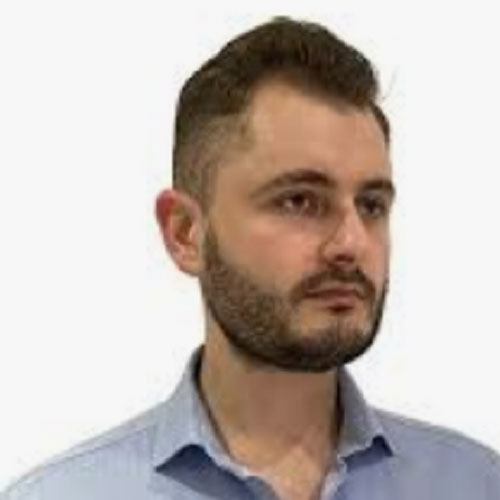
Nathaniel Fried
Human Targeting: Effective Methods for Online Person Search
Nathaniel Fried leads research and development at Osint industries, specializing in automated OSINT solutions and people-finding technologies. His background includes developing innovative approaches to global person localization and identity verification. At Osint industries, he designs systems that integrate multiple data sources to streamline the process of locating and identifying individuals worldwide.
This intensive training delivers the latest methodologies and tools for precise, efficient global person identification in the digital age. Attendees will master a range of advanced techniques to locate, verify, and profile individuals—whether for investigative, compliance, or intelligence purposes. Participants will learn how to:

Karina Shedrofsky
Unmasking Offshore Companies: Investigative Techniques and Tools
Karina Shedrofsky is the Co-Founder and Director of Research at the Data and Research Center (DARC). Previously, led the research and data team at the Organized Crime and Corruption Reporting Project (OCCRP), specializing in transnational financial investigations. Her work has focused on exposing illicit financial flows, unraveling corporate secrecy structures, and mapping beneficial ownership networks. At OCCRP, she contributed to major cross-border investigations that uncovered complex offshore arrangements used to conceal wealth and evade taxes.
Her training provides in-depth, practical methodologies for investigating opaque offshore corporate structures and financial secrecy. Attendees will learn advanced techniques for identifying beneficial owners, tracing assets across different jurisdictions, and mapping relationships between shell companies using both open-source intelligence and network analysis tools. The session covers key offshore registry resources, strategies for interpreting leaked datasets and public filings, and hands-on document analysis to uncover red flags or inconsistencies in corporate records. Participants will also explore approaches for following complex money trails, recognizing transaction patterns that indicate laundering or concealment, and overcoming common obstacles like nominee directors or layered ownership structures. The training addresses the importance of international cooperation, tips for cross-border information gathering, and provides an overview of current legal and ethical considerations when investigating global corporate networks designed to obscure ownership and financial flows.

Carlos Valderrama
Beyond Surface: Investigating Crime and Threats on the Dark Web
Carlos Valderrama serves as a threat intelligence specialist at Straumann Group, bringing extensive experience in cybersecurity and digital risk assessment. His background includes roles in threat detection, vulnerability management, and security operations at major enterprises. At Straumann Group, he leads initiatives to identify and mitigate emerging threats to the organization’s digital assets and operations.
This training delivers advanced, real-world methodologies for conducting effective dark web investigations, equipping attendees with both strategic understanding and hands-on skills. Participants will learn secure access techniques—including the use of privacy-focused operating systems, VPNs, and Tor—as well as best practices for safely navigating diverse darknet marketplaces, forums, and encrypted communication channels. Attendees will be introduced to specialized tools for dark web research and analysis. Practical strategies for correlating criminal or suspicious activities across the surface, deep, and dark web will be shared, along with case studies and workflow demonstrations, empowering investigators to generate actionable intelligence from fragmented and often volatile sources

Leonida Reitano
Next-Level OSINT: Harnessing Maltego and Social Links
Leonida Reitano brings his extensive experience as an Italian Police OSINT instructor and chairman of the Associazione Giornalismo Investigativo to this specialized presentation. As a certified Social Links trainer since 2018, he has developed advanced methodologies for social network analysis. His background in data journalism and investigative techniques provides unique insights into effective digital investigations across multiple platforms.
This intensive, hands-on course is designed for OSINT professionals seeking to elevate their investigative skills with Maltego and Social Links. Participants will explore advanced techniques for mapping, analyzing, and interpreting complex social networks, moving beyond basic transforms to unlock deeper intelligence from open sources. Attendees will gain expertise in:
Advanced Social Network Mapping: Leveraging Maltego’s graph-based interface to visualize intricate relationships among individuals, organizations, and digital assets
Social Links Integration: Seamlessly incorporating Social Links’ expansive datasets to enrich Maltego investigations with data from a wide range of platforms, including Facebook, LinkedIn, Telegram, and more.
Data Fusion and Correlation: Merging disparate datasets to identify cross-platform linkages, triangulate identities, and build unified intelligence pictures from fragmented traces.
Case-Driven Methodology: Working through real-world scenarios—such as fraud detection, threat actor profiling, and geopolitical risk mapping—to practice workflows and analytical strategies used by leading intelligence teams.

Marcus Lindemann
Google Hacking: Exploiting the Most Powerful Search Engines for OSINT
Marcus Lindemann is managing author at autoren(werk), producing consumer investigations for ARD and ZDF since 2000, often using hidden cameras. Since 1998, he has taught online investigative research to thousands of journalists, as well as police and insurance fraud investigators. Internationally, he trains journalists in Africa and Asia using the “Story-Based Inquiry” method and has spoken at several Global Investigative Journalism Conferences.
This session equips attendees with advanced techniques for harnessing Google and other search engines as powerful OSINT tools, moving far beyond basic keyword searches. Participants will learn how to construct precise queries using advanced operators, exploit hidden search features, and systematically uncover deep web content, breached data, and non-indexed resources. The course explores tailored workflows for investigating individuals, organizations, digital infrastructure, and tracking threat actor activity, as well as methods for automating repetitive searches and bypassing access restrictions or geo-blocking barriers. Attendees will also discover how to utilize Google Dorking for targeted document retrieval, metadata analysis, and identifying security vulnerabilities in public-facing assets. By the end of the session, participants will be able to transform search engines into strategic intelligence-gathering platforms—dramatically enhancing their capabilities for due diligence, threat assessment, and the exposure of concealed or overlooked online footprints.

Dr. Sheeba Armoogum
Ethical Intelligence Across Borders: Unifying OSINT-Driven Threat Intelligence and Digital Forensics Through AI and Global Governance
Dr. Sheeba Armoogum holds a PhD in Cybersecurity and is an Associate Professor in the Department of ICT at the University of Mauritius (UoM). She is a globally respected Cybersecurity Architect with over 20 years of expertise spanning academia, applied research, digital policy, and high-level governance. She also serves as an Independent Non-Executive Director at Rogers Capital Technology, where she advises on digital resilience, cybersecurity strategy, and AI ethics.
Dr. Sheeba has advanced cybersecurity innovation through two landmark patents filed and issued by the South African Patent Office. She is also the sole inventor of “An Extended Genetic Technique Based Intrusion Detection and Prevention System” (WIPO Classification H04L), commercially referred to as CyberThreat DNA. She is the co-inventor of “AI-Driven Ethical Governance System and Method for Unified Cyber Threat Intelligence and Digital Forensics Incident Response” (WIPO Classification G06F), a next-generation platform that unifies CTI (Cyber Threat Intelligence) and DFIR (Digital Forensics Incident Response). The system emphasises scalability, automation, and ethical compliance, offering proactive threat prediction and bias-mitigated forensic decision-making. At the University of Mauritius, Dr. Sheeba leads the CyberSecurity & Forensics Research Group (CSFRG), supervises PhD research in cybersecurity, cyberpsychology, and AI, and publishes extensively in high-impact Q1 and Q2 journals. A former Head of Department and a national Subject Specialist in Cybersecurity, she is also deeply engaged in digital literacy outreach, ethical technology advocacy, and international cyber governance.
Sheeba’s session explores how OSINT-driven Cyber Threat Intelligence (CTI) and Digital Forensic Incident Response (DFIR) can be unified through ethically governed, AI-enabled frameworks. It addresses the critical need for global norms that strike a balance between investigative efficiency and privacy, transparency, and legal compliance. Key themes include the responsible design of interoperable CTI–DFIR systems, cross-border data governance, and the role of AI in ensuring both agility and accountability. Attendees will gain strategic insights into building cyber intelligence infrastructures that operate across jurisdictions while respecting digital rights and ethical boundaries.

Dr. Sheeba Armoogum
Roundtable Discussion: The Impact of AI on OSINT
Dr. Sheeba Armoogum holds a PhD in Cybersecurity and is an Associate Professor in the Department of ICT at the University of Mauritius (UoM). She is a globally respected Cybersecurity Architect with over 20 years of expertise spanning academia, applied research, digital policy, and high-level governance. She also serves as an Independent Non-Executive Director at Rogers Capital Technology, where she advises on digital resilience, cybersecurity strategy, and AI ethics.
Dr. Sheeba has advanced cybersecurity innovation through two landmark patents filed and issued by the South African Patent Office. She is also the sole inventor of “An Extended Genetic Technique Based Intrusion Detection and Prevention System” (WIPO Classification H04L), commercially referred to as CyberThreat DNA. She is the co-inventor of “AI-Driven Ethical Governance System and Method for Unified Cyber Threat Intelligence and Digital Forensics Incident Response” (WIPO Classification G06F), a next-generation platform that unifies CTI (Cyber Threat Intelligence) and DFIR (Digital Forensics Incident Response). The system emphasises scalability, automation, and ethical compliance, offering proactive threat prediction and bias-mitigated forensic decision-making. At the University of Mauritius, Dr. Sheeba leads the CyberSecurity & Forensics Research Group (CSFRG), supervises PhD research in cybersecurity, cyberpsychology, and AI, and publishes extensively in high-impact Q1 and Q2 journals. A former Head of Department and a national Subject Specialist in Cybersecurity, she is also deeply engaged in digital literacy outreach, ethical technology advocacy, and international cyber governance.
The roundtable discussion on “The Impact of AI on OSINT” will bring together leading experts to explore how artificial intelligence is transforming open-source intelligence gathering and analysis. Participants will examine AI-driven advancements such as automated data collection, real-time pattern recognition, enhanced natural language processing, and predictive analytics that significantly increase OSINT’s speed, accuracy, and scope. The dialogue will also address emerging challenges including ethical considerations, misinformation detection, data privacy, and the need for human oversight in AI-assisted intelligence workflows. Ultimately, the discussion aims to provide a comprehensive understanding of AI’s role in reshaping OSINT methodologies and its implications for intelligence professionals worldwide.
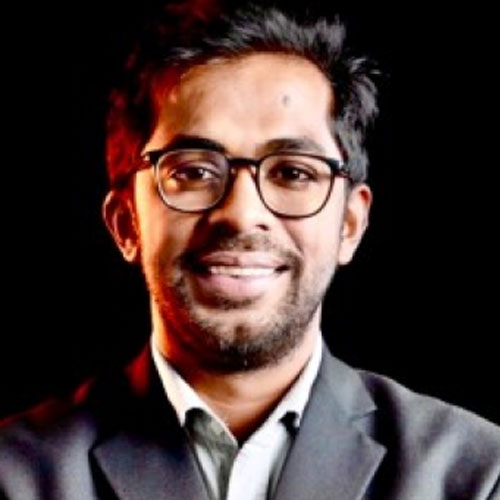
Dr. Heman Mohabeer
Roundtable Discussion: The Impact of AI on OSINT
Dr. Heman Mohabeer is one of Africa’s foremost experts in applied artificial intelligence and digital transformation strategy. A Mauritian AI researcher, educator, and founder of Intelligent Africa Solutions Ltd, Dr. Mohabeer has been a leading voice in the ethical advancement and practical deployment of AI across the continent. With over 20 years of experience at the intersection of machine learning, automation, and enterprise innovation, he has played a pivotal role in making cutting-edge technologies accessible and impactful in both public and private sectors. A PhD holder in Artificial Intelligence, Dr. Mohabeer has built a career bridging academic research and practical solutions across domains such as finance, education, governance, and cybersecurity. His work on intelligent automation, compliance frameworks, and AI-powered learning platforms has gained recognition in Mauritius and beyond. Dr. Mohabeer is the author of The Digital Transformation Playbook and an in-demand speaker and advisor, having trained professionals, institutions, and startups on AI-readiness, innovation policy, and responsible AI deployment. As a thought leader, he frequently contributes to national digital strategies and mentors emerging African tech leaders. His workshops and keynote sessions delve into the real-world integration of AI across industries, showing how tools like ChatGPT and Langflow can augment business intelligence, automate workflows, and drive data-informed decision-making. Participants leave with practical strategies for implementing AI responsibly—balancing algorithmic capabilities with human context to create trustworthy and sustainable innovation.
The roundtable discussion on “The Impact of AI on OSINT” will bring together leading experts to explore how artificial intelligence is transforming open-source intelligence gathering and analysis. Participants will examine AI-driven advancements such as automated data collection, real-time pattern recognition, enhanced natural language processing, and predictive analytics that significantly increase OSINT’s speed, accuracy, and scope. The dialogue will also address emerging challenges including ethical considerations, misinformation detection, data privacy, and the need for human oversight in AI-assisted intelligence workflows. Ultimately, the discussion aims to provide a comprehensive understanding of AI’s role in reshaping OSINT methodologies and its implications for intelligence professionals worldwide.

Sam Tilston
DNS Deep Dive: Advanced Techniques for Intelligence Gathering
Sam Tilston is a seasoned cybersecurity expert and entrepreneur with over 20 years of experience in the tech industry. He is the founder of Effect Group, a London-based company specializing in open-source intelligence (OSINT) platforms designed to streamline information gathering and enhance strategic planning for businesses and organizations
Certified as an ethical hacker and a Microsoft Certified Systems Engineer, Sam has been at the forefront of internet technology since its early days. His work focuses on developing systems and platforms that aim to maximize social impact, political benefit, and economic potential . Through Effect Group, Sam continues to innovate in the realm of open-source intelligence, providing tools that empower organizations to make informed decisions in an increasingly complex digital world.
Advanced Domain Name Intelligence involves leveraging comprehensive analysis of domain registration data, DNS traffic patterns, historical domain information, and reputation scoring to detect and mitigate cyber threats such as phishing, malware distribution, and domain spoofing. By combining open-source intelligence, machine learning algorithms, and threat intelligence feeds, this approach enables real-time identification of malicious domains and protects brand integrity, supports fraud detection, and informs strategic business decisions. As digital threats evolve, integrating AI and automated processes enhances the accuracy and speed of domain intelligence, making it an essential tool for cybersecurity professionals and organizations seeking to safeguard their online presence and assets.
As digital threats grow more complex and widespread, this intelligence capability is essential for cybersecurity professionals and organizations seeking to safeguard their online presence, protect customer trust, and maintain regulatory compliance. It provides a proactive defense layer that strengthens overall security posture and resilience against sophisticated cyberattacks.

Kim Silander
Eyes in the Sky: Integrating Drone Intelligence with OSINT
Kim Silander is an aviation specialist with over 25 years of experience in the sector. He is a leading specialist in drone operations and airspace integration, with a strong focus on enabling societal services such as law enforcement, rescue, and fire operations. As founder of Advanced Air Mobility AAM AB, a spin-off from Independent Business Group Sweden AB, Kim leads initiatives that make Beyond Visual Line of Sight (BVLOS) drone use cases viable by tackling regulatory and operational challenges that limit adoption today.
His current projects demonstrate how BVLOS drone operations can be integrated within existing aviation frameworks to enable real-time aerial surveillance, thermal imaging, and high-resolution mapping—providing cost-effective and scalable support for public safety and emergency response.
Eyes in the Sky: Integrating Drone Intelligence with OSINT explores the powerful convergence of aerial surveillance and open-source intelligence. This session delves into how drone technology can augment OSINT investigations by providing real-time, high-resolution imagery and geospatial data from inaccessible or high-risk areas. From conflict zones to border monitoring, drones serve as mobile sensors that enhance situational awareness and tactical decision-making. The speaker will present real case studies demonstrating the integration of drone footage with satellite imagery, social media geolocation, and SIGINT-derived metadata. Emphasis will be placed on cross-validating open sources with live drone feeds to uncover hidden patterns, movements, and anomalies. The session will also address regulatory constraints, privacy issues, and ethical considerations in civilian and investigative contexts. Attendees will learn how to build workflows that fuse drone data with OSINT platforms for actionable intelligence. Finally, the talk will explore future developments, including AI-driven object recognition and autonomous surveillance.

David Tannenbaum
Unmasking Dark Fleets: Tracking Ships and Aircraft in Global Crime
David Tannenbaum is a seasoned expert in sanctions compliance and maritime intelligence, with a career spanning both public and private sectors. He began his professional journey at the U.S. Department of the Treasury’s Office of Foreign Assets Control (OFAC), where he developed a strong foundation in national security and regulatory enforcement. Leveraging this experience, he founded Blackstone Compliance Services, an advisory firm specializing in anti-money laundering (AML) and sanctions compliance for financial institutions and commodity traders.
This presentation by David Tannenbaum delves into the complex and rapidly evolving threat landscape posed by the “dark fleet”—a network of vessels that operate under opaque ownership structures, manipulate AIS signals, and engage in deceptive shipping practices to bypass international sanctions. These ships are often used to transport sanctioned oil and commodities, threatening both regulatory compliance and global maritime security. Attendees will gain a detailed understanding of the tactics used by these vessels, including flag hopping, identity laundering, and illicit ship-to-ship transfers conducted in high-risk zones.
Tannenbaum will demonstrate how cutting-edge maritime intelligence platforms and satellite data can be used to uncover hidden vessel movements, trace cargo origins, and flag anomalous behaviors in near real time. The session will also provide insights into integrating maritime sanctions monitoring into institutional compliance programs, with practical frameworks for risk scoring, due diligence, and escalation procedures. By the end, participants will be better equipped to detect and mitigate the risks posed by shadow maritime networks, ensuring adherence to international legal standards and protecting organizations reputations.

Katherine de Tolly
Following the Money: Investigating Companies with Sanctions Databases
Katherine de Tolly is an open source (OSINT) researcher and data wrangler at Bellingcat, an award-winning collective of investigators advancing justice and transparency. She specialises in scouring the Web to use an entity’s digital footprint to connect the dots and bring to light issues of exploitation and corruption. She has contributed to high-impact investigations and developed resources for the OSINT community as part of Bellingcat’s Financial Investigations team.
This presentation explores the use of sanctions databases in investigations, offering a practical guide for using these resources to uncover financial crime, corruption, and illicit networks. Attendees will learn how to access and cross-reference data from key global sanctions lists—such as those maintained by OFAC, the EU, UN, and national authorities—and how to use that data to trace connections between sanctioned individuals, entities, and affiliated networks.
The session will introduce practical techniques for analyzing complex networks involving politically exposed persons (PEPs), front companies, and intermediaries . Participants will also examine red flags and compliance risk indicators that can help identify hidden links between seemingly legitimate business structures and high-risk individuals. Through case studies, the presentation demonstrates how sanctions data, when combined with OSINT and financial intelligence, can support investigations into money laundering, and violations of international law.
By the end of the session, attendees will better understand open sources of data for investigations involving sanctioned individuals and entities, and some of the pitfalls to look out for.

Nathaniel Fried
Find Anyone, Anywhere — Instantly
Nathaniel Fried leads research and development at Osint Industries, specializing in automated OSINT solutions and people-finding technologies. His background includes developing innovative approaches to global person localization and identity verification. At Osint Industries, he designs systems that integrate multiple data sources to streamline the process of locating and identifying individuals worldwide.
This presentation showcases advanced methodologies for high-speed global person identification, drawing on the latest developments in data fusion, OSINT automation, and cross-platform analysis. Attendees will explore how to efficiently triangulate identity information using open databases, social media footprints, leaked datasets, and public records across multiple jurisdictions. The session emphasizes how automation and intelligent query design can dramatically reduce time spent on manual searches while increasing accuracy and depth of results.
Participants will be introduced to a suite of tools designed for bulk data extraction, facial recognition comparisons, reverse image searches, and email/phone number correlation to build comprehensive biographical profiles. The presentation also delves into verification protocols for authenticating identities, including behavioral pattern matching and document metadata analysis, helping investigators distinguish genuine targets from false positives or decoys.

Karina Shedrofsky
Piercing the Veil: Investigating Offshore Structures
Karina Shedrofsky is the Co-Founder and Director of Research at the Data and Research Center — DARC, which provides bespoke data and research services to investigative teams. Previously, she led the research and data team at the Organized Crime and Corruption Reporting Project (OCCRP), where she supported journalists with OSINT to crack cases involving offshore companies, untangle complex networks, and track down people and assets that didn’t want to be found. Her work on award winning investigations has focused on exposing illicit financial flows, corporate secrecy structures, and beneficial ownership networks.
This presentation delivers practical methodologies for investigating opaque offshore corporate structures often used to conceal illicit financial activity, tax evasion, or corruption. Attendees will learn advanced techniques for identifying beneficial owners hidden behind layers of nominees and intermediaries, as well as methods for tracking assets across multiple jurisdictions and legal entities. The session dives into mapping relationships between shell companies, trusts, and front organizations using graph analysis tools and open-source databases. It will also cover how to navigate key offshore registries—such as those in the British Virgin Islands, Panama, and Seychelles—and how to extract meaningful intelligence from often fragmented or deliberately obscured records
The presentation highlights case studies where complex corporate arrangements were unraveled to expose corruption, money laundering, or sanctioned entity networks, emphasizing investigative rigor and legal defensibility.

Christiaan Triebert
Geospatial Intelligence: Uncovering International Crime Networks
Christiaan Triebert is an award-winning investigative journalist and reporter at The New York Times, where he works on the Visual Investigations team. This team pioneers a new form of journalism that merges traditional reporting with advanced digital forensics, using tools like satellite imagery, social media analysis, cellphone videos, and 3D reconstructions to uncover and explain major global events. Before joining The Times in 2019, Triebert was a senior investigator and lead trainer at Bellingcat, where he specialized in open source intelligence and trained journalists worldwide in digital verification. Notably, he won the European Press Prize Innovation Award in 2017 for reconstructing the Turkish coup attempt through analysis of leaked WhatsApp messages and social media posts.
Christiaan Triebert’s presentation examines how cutting-edge geospatial intelligence (GEOINT) techniques are transforming the field of international criminal investigations. The session emphasizes how open-source satellite data, combined with tools like terrain analysis and shadow measurement, can precisely verify locations, timestamps, and the sequence of events.
Christiaan will show advanced techniques for corroborating eyewitness accounts, social media evidence, and leaked data with geospatial artifacts, creating a multi-source verification process.
Real-world case studies from conflict zones, drawn from the work of the New York Times Visual Investigations team, will be used to illustrate how investigative journalism can intersect with legal accountability through rigorous geospatial analysis.

Leonida Reitano
Maltego in Action: Social Network Intelligence Techniques
Leonida Reitano brings his extensive experience as an Italian Police OSINT instructor and chairman of the Associazione Giornalismo Investigativo to this specialized presentation. As a certified Maltego trainer since 2018, he has developed advanced methodologies for social network analysis. His background in data journalism and investigative techniques provides unique insights into effective digital investigations across multiple platforms.
His presentation demonstrates advanced techniques for mapping and analyzing social networks using Maltego, a powerful tool for graph-based data visualization and investigation. Attendees will be guided through methodologies for visualizing complex relationships between individuals, organizations, and digital identities across various online platforms. The session will explore both manual and automated approaches to building dynamic network maps that help uncover affiliations, hierarchies, influence paths, and communication clusters.
Participants will gain hands-on insights into developing and deploying custom transforms tailored to their investigative goals—enabling the extraction and fusion of data from sources such as Twitter, LinkedIn, Telegram, and the deep/dark web. Special focus will be given to integrating disparate datasets into a unified investigative environment, using Maltego’s modular structure to manage scale, reduce noise, and isolate relevant entities within sprawling data landscapes.
The presentation will also introduce pattern recognition techniques within social graphs, such as detecting echo chambers, identifying gatekeepers, and tracing influence networks or disinformation flows. Analytical strategies for temporal analysis, geolocation tagging, and metadata enrichment will be discussed to help investigators move beyond surface-level connections and derive meaningful, actionable intelligence.

Carlos Valderrama
Inside the Dark Web: Investigative Strategies and Techniques
Carlos Valderrama serves as a threat intelligence specialist at Straumann Group, bringing extensive experience in cybersecurity and digital risk assessment. His background includes roles in threat detection, vulnerability management, and security operations at major enterprises. At Straumann Group, he leads initiatives to identify and mitigate emerging threats to the organization’s digital assets and operations.
Carlos’s session offers a practical journey into the hidden layers of the internet, where anonymity fuels the exchange of illicit information and the rise of emerging threats. It explores the architecture of the dark web, where threat actors trade data, services, and illegal goods beyond the reach of traditional surveillance. This presentation unveils the inner workings of darknet marketplaces, data leak forums, and anonymous communication hubs. Drawing from real investigations, the talk demonstrates how pseudonymous actors are tracked, how cryptocurrency flows expose hidden infrastructures, and how seemingly isolated signals connect into broader threat patterns.

Carlos Valderrama
Operational Threat Intelligence: Turning Strategy into Action for Enhanced Cyber Resilience
Carlos Valderrama serves as a threat intelligence specialist at Straumann Group, bringing extensive experience in cybersecurity and digital risk assessment. His background includes roles in threat detection, vulnerability management, and security operations at major enterprises. At Straumann Group, he leads initiatives to identify and mitigate emerging threats to the organization’s digital assets and operations.
Carlos’ presentation delivers a comprehensive and practical framework for building and executing robust threat intelligence programs within both public and private sector organizations. Attendees will explore the full spectrum of intelligence operations, from high-level strategic planning to hands-on tactical execution. The session begins with methodologies for profiling threat actors—examining motivations, capabilities, and behavioral patterns—and then moves into structured approaches for collecting, validating, and contextualizing intelligence data from diverse sources, with a particular emphasis on open source intelligence (OSINT) as a foundational layer.
Participants will gain insight into how to embed threat intelligence into enterprise security operations through the development of internal intelligence cycles, fusion centers, and cross-functional collaboration between analysts, incident response teams, and leadership. Carlos will demonstrate how to operationalize intelligence through real-time threat hunting, correlation with SIEM data, and predictive risk modeling that helps organizations anticipate and mitigate emerging threats. The presentation also covers the design of intelligence requirements frameworks, threat modeling tools, and dissemination strategies to ensure the right insights reach the right decision-makers at the right time.

Jan Suhr
Stealth and Security: Advanced OPSEC for OSINT Professionals
Jan Suhr is the founder and CEO of Nitrokey, a Berlin-based company established in 2015 that specializes in open source development of computer security hardware. Under his leadership, the company has developed secure technical infrastructure for protecting IT products and sensitive data. His company provides hardware security modules and innovative software stacks with verified microkernel and unikernel package systems, all built on open source principles.
Stealth and Security: Advanced OPSEC for OSINT Professionals addresses the critical operational security needs of OSINT professionals operating in high-risk environments, with a focus on integrating Qubes OS and Maltego into a hardened investigative workflow. Attendees will understand how Qubes OS’s security-by-isolation works. The talk also explores how to run Maltego effectively within Qubes OS, demonstrating methods to separate online pivoting, local data enrichment, and export operations into distinct domains. This setup not only enhances operational security but also allows analysts to manage attribution, control metadata leakage, and avoid tainting core investigative environments. Additional topics include secure communication workflows within Qubes OS using encrypted email clients and messaging platforms confined to whitelisted Qubes, use of hardware tokens and isolated USB controllers, and anti-surveillance measures such as MAC address randomization and VPN/Tor routing inside disposable VMs.
By the end of the presentation, participants will understand how a robust OPSEC stack is created by integrating Qubes OS and Maltego into a secure, anonymous, and resilient investigative environment—one that meets the demands of modern digital threat landscapes without compromising effectiveness or traceability

Leonida Reitano
OSINT is not Coding. The Role of Methodology and Intelligence Analysis
Leonida Reitano has served as an Italian Police Open Source Intelligence Instructor at Polizia di Stato since 2017. He is also Chairman at Associazione di giornalismo investigativo (since 2007), OSINT trainer at Associazione Giornalismo Investigativo (since 2012), and Scientific Director at Minerva Publishing House (since 2013). His extensive experience includes roles as an OSINT trainer for various organizations including Green Sistemi and as a Maltego Trainer.
This presentation emphasizes the critical analytical foundations of OSINT, focusing on the discipline’s methodological and interpretative aspects beyond the use of technical tools. Attendees will learn structured, repeatable methodologies for converting raw and fragmented information into reliable, actionable intelligence. The session will explore the full implementation of the intelligence cycle—from planning and direction to collection, processing, analysis, and dissemination. It will delve into analytical frameworks for evaluating source reliability and content credibility, with particular attention to the challenges of misinformation and disinformation. Participants will also examine techniques to recognize and mitigate cognitive biases that can distort analysis, and will be guided in crafting intelligence products that are both operationally relevant and strategically sound. The session aims to re-center OSINT practice on critical thinking, methodological rigor, and the production of intelligence that supports real-world decision-making in law enforcement, journalism, corporate security, and national defense.

Paul Myers
OSINT 2.0: Leveraging ChatGPT and Next-Gen AI Tools
The BBC’s top online sleuth Paul Myers is one of Europe’s leading open-source intelligence specialists and a very popular and engaging speaker. is a senior journalist and open-source intelligence (OSINT) specialist at BBC Verify, the BBC’s investigative unit focused on disinformation, verification, and digital forensics. He joined the BBC in 1995 and has been at the forefront of online investigation for nearly three decades, pioneering many of the digital research techniques now standard in journalism . Myers leads training and investigative support across BBC programs, including *Panorama*, *Watchdog*, and the BBC World Service . He also runs [ResearchClinic.net](https://www.researchclinic.net/), a resource hub for investigative journalists and OSINT practitioners. His expertise is sought globally, having trained teams at the UN, World Bank, CNN, and major UK media outlets. Myers is a co-author of *Digital Witness* and *The Verification Handbook*, and is a frequent speaker at investigative journalism conferences and a member of the International Consortium of Investigative Journalists (ICIJ)
This presentation explores the revolutionary impact of AI tools like ChatGPT on OSINT workflows and investigative capabilities. Attendees will learn practical applications of artificial intelligence for accelerating the pace of investigations, automating the collection and structuring of open-source data, and identifying patterns or anomalies across vast datasets. The session will demonstrate cutting-edge techniques for integrating AI into traditional OSINT methodologies. Additionally, it will highlight emerging use cases such as AI-assisted geolocation. Finally, the session will critically address the ethical considerations, potential biases, and operational risks associated with AI-augmented investigations, offering guidance on how to responsibly implement these technologies within both public and private intelligence contexts.

Robert Merriot
Digital Evidence Gathering: Best Practices with Forensic OSINT
Robert is a seasoned law enforcement professional with over 18 years of experience as a municipal police officer, specializing in Digital Forensics and Cybercrime. Prior to his policing career, he earned a Bachelor of Science in Computer Information Systems and worked as a web application developer, receiving recognition as a Microsoft MVP. As the founder of Forensic Notes, Robert has been pivotal in establishing the platform as an industry standard for digital note-taking, widely adopted in both civil and criminal investigations to enhance documentation accuracy, efficiency, and integrity.
Robert’s presentation introduces participants to the fundamentals of internet evidence collection and digital forensics for web-based investigations, integrating OSINT and forensic methodologies for a comprehensive investigative approach.
Attendees will learn the importance of the digital forensic process and will be shown how to systematically acquire, preserve, and analyze online evidence from websites and social media, via Forensics Osint App.

Marcus Lindemann
Cutting-Edge Tracking Tools for Investigative Work
Marcus Lindemann is managing author at autoren(werk), producing consumer investigations for ARD and ZDF since 2000, often using hidden cameras. Since 1998, he has taught online investigative research to thousands of journalists, as well as police and insurance fraud investigators. Internationally, he trains journalists in Africa and Asia using the “Story-Based Inquiry” method and has spoken at several Global Investigative Journalism Conferences.
Journalists have long relied on GPS tracking devices to trace the global journey of second-hand clothes, bicycles, and electronic waste—tools that have proven invaluable in uncovering hidden supply chains and environmental violations. However, traditional GPS trackers often come with drawbacks: they are typically bulky, conspicuous, and suffer from short battery life, which can compromise both the duration and discretion of an investigation. In recent years, Bluetooth-based alternatives like Apple’s AirTags and Samsung’s SmartTags have emerged as a compelling solution. These compact and energy-efficient devices offer increased operational longevity and a significantly lower visual and electronic footprint, making them particularly useful for investigations that require prolonged and undetected monitoring.
Claus Hesseling, Sebastian Mondial, and the investigative teams at Greenpeace and autoren(werk) have been at the forefront of exploring these technologies in real-world contexts. Their investigations have demonstrated how Bluetooth trackers can be embedded in objects to track their movement across borders and through various commercial or illegal channels. However, their work also highlights a number of operational challenges—such as scraping positional data from proprietary ecosystems, the potential for detection through built-in alert systems, and the varying performance of trackers depending on network density and geographic location.

Jessica Chuah
Cryptocurrency Investigations: Tools, Tactics, and Tradecraft
Jessica joined Crystal in March 2024, bringing with her a dynamic portfolio of experience in emerging technologies across the ASEAN region. Her career has spanned a range of roles at the intersection of fintech, compliance, and digital innovation, with a particular focus on initiatives such as e-wallet platforms that enable cross-border wire transfers, payroll automation, and remittance services. Jessica holds an LL.B (Honours) from the University of London and is a Fellow of the Association of Chartered Certified Accountants (FCCA). She is also an ASEAN Chartered Professional Accountant (ASEAN CPA) and a Certified Anti-Money Laundering Specialist (CAMS), underscoring her strong foundation in regulatory compliance and financial integrity within complex, fast-evolving digital ecosystems. Her multidisciplinary expertise positions her as a key contributor to Crystal’s growth in regulated and technology-driven markets.
Cryptocurrency Investigations: Tools, Tactics, and Tradecraft delves into the specialized methods and technologies used to investigate criminal activities involving digital assets. As cryptocurrencies become increasingly integrated into both legitimate finance and illicit economies, investigators must stay ahead of rapidly evolving threats. This session will equip participants with advanced blockchain analysis techniques for uncovering hidden connections, identifying suspicious wallet behaviors, and mapping out transaction flows that may point to money laundering, ransomware payments, darknet market transactions, or terror financing. Attendees will gain hands-on insights into the use of leading cryptocurrency tracing platforms—such as Chainalysis, TRM Labs, and CipherTrace—and how to apply heuristics, clustering algorithms, and transaction graphing to untangle complex laundering schemes across multiple wallets and blockchains. The session will also explore the role of privacy coins, mixers, and decentralized exchanges (DEXs) in obfuscating trails and how investigators can respond with forensic persistence. Real-world case studies will illustrate how digital asset investigations support regulatory enforcement, criminal prosecutions, and the recovery of stolen fund
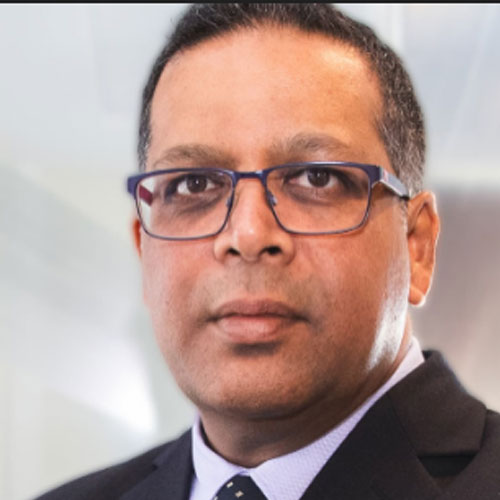
Dev Hurkoo
Cyber Resilience for Businesses in the AI Era.
Dev is a seasoned professional with over 25 years of experience in the telecom and information technology sector. He is the Managing Director at Rogers Capital Technology and key speaker driving thought leadership on digital innovation, business resilience and cybersecurity in theAfrican region. After his graduation in IT at Supelec in France, Dev joined Orange Mauritius Telecom where he gained a strong expertise in Technology, Telecom and Cybersecurity. He was the key architect of the first national broadband Internet infrastructure in Mauritius, and, as CIO, he transformed the entire IT infrastructure and application systems of Mauritius Telecom for it to operate as an integrated Fixed, Mobile and Internet operator. Dev also worked as General Manager of Telecom Plus and Teleservices, making them the leading companies in the Internet and advertising businesses before founding his own IT company.
He joined Rogers Capital Technology as Managing Director in 2018 to spearhead innovation and accelerated digital transformation in fintech and other key industries in Mauritius and the region. Dev is the Chairman of the Mauritius Institute of Directors (MIoD). He is also a Board member of OTAM, the leading association of ICT/BPOs and Telecom Operators, and of FINAM, which is a federation regrouping the 3 major ICT associations of Mauritius, namely OTAM, MITIA and CCIFM.
Cyber Resilience for Businesses in the AI Era is a 30-minute presentation that explores how organizations can adapt and thrive amid the growing complexity of cyber threats in an AI-driven world. As artificial intelligence reshapes the threat landscape—empowering both defenders and attackers—traditional security models are no longer sufficient. This talk examines the shift from reactive cybersecurity to proactive cyber resilience, highlighting the importance of preparedness, rapid recovery, and business continuity. Attendees will gain insight into real-world examples where AI has been used in both offensive and defensive cyber operations. e frameworks, incident response planning, and the role of human-AI collaboration. Designed for business leaders, CISOs, and IT professionals, this session provides actionable strategies to future-proof organizational infrastructure, reduce downtime, and ensure operational integrity.
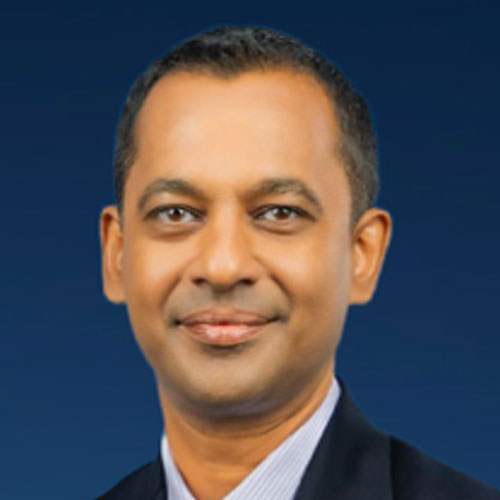
Dr Veemal Gungadin
The risk of AI
Veemal Gungadin, Chief Executive Officer of Mauritius Telecom since April 2025, brings over 20 years of experience in digital transformation, innovation, and AI-driven solutions across global markets. He co-founded GlobalSign.In and served as its CEO until April 2025, providing secure digital platforms for governments and enterprises, and also led GEVME, where he pioneered technologies like Snapsight and Spark. He played a key role in national digital infrastructure projects for the Singaporean government and forged strategic partnerships with providers such as Singtel. From 2022 to 2025, he was Honorary Secretary of SACEOS, and served on the Board of Directors and Trustees of PCMA in Chicago. Recognised among Eventex’s 50 Most Influential People in Asia’s events industry in 2024, he also received the Digital Innovation of the Year award in 2023 and the SACEOS Pioneering Award in 2020. He holds a Bachelor’s degree in Computing from the National University of Singapore.
The risk of AII speech explores the risks posed by AI in critical sectors such as financial services, education, healthcare, transport, and corporate environments are increasingly significant. In finance, AI systems can lead to biased decision-making, fraud vulnerabilities, and operational failures. In education, reliance on AI may risk privacy breaches and reduce human oversight in learning processes. Healthcare AI applications carry the potential for diagnostic errors and data security concerns. Transportation systems using AI face challenges related to safety, system malfunctions, and ethical decision-making in autonomous vehicles. Within corporate settings, AI risks include data misuse, loss of jobs, and unintended consequences from automated processes. Understanding and managing these risks is essential to harness AI’s benefits responsibly across these vital areas.
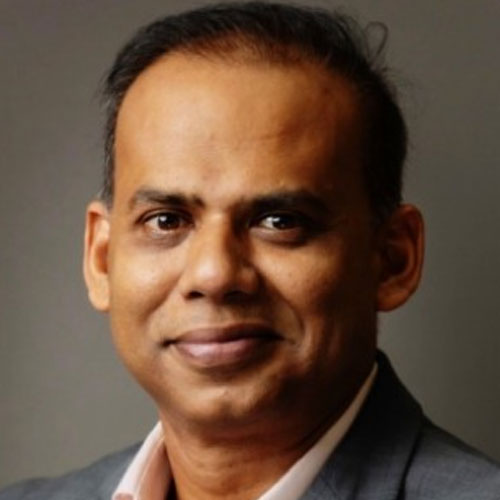
Sandeep Mohapatra
Role of AI in countering Financial Crimes
Sandeep Mohapatra is the Head of Digital Transformation and Technology at Absa Bank (Mauritius) Limited. With over 15 years of experience in banking and financial services, Sandeep has held senior roles spanning innovation, business, and marketing. At Absa Mauritius, he leads the digital transformation agenda, championing customer-first innovations and launching globally recognised solutions that are reshaping the banking landscape. Sandeep firmly believes in thinking big, taking ownership, and executing relentlessly to drive paradigm shifts.
Sandeep will present a forward-looking framework for combating financial crimes through the strategic use of advanced compliance tools. His session will provide a deep dive into how financial institutions can leverage AI and emerging technologies to solve for customer identity, document management, transaction monitoring, fraud detection to detect, deter, and disrupt illicit financial activities in a digitally transforming world.
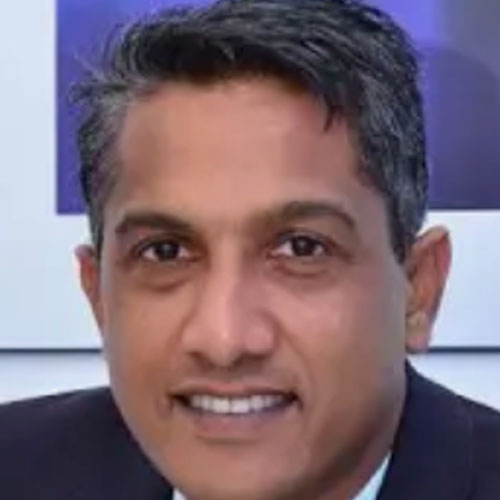
Avinash Ramtohul
Setting the bar for an AI ready nation
Dr. Avinash Ramtohul, Minister of Information Technology, Communication, and Innovation in Mauritius, brings over 27 years of extensive IT experience across Africa and the Middle East, including leadership roles as Managing Director at Oracle and founder of Alludo. Holding a PhD in Information Security alongside multiple degrees in law, business, and technology from international universities, Dr. Ramtohul has spearheaded initiatives to modernize government services through digital platforms, enhance data protection, establish national AI standards, and promote gender equality in ICT. He is driving the creation of a dedicated AI Office to regulate and foster responsible AI development, ensuring data security and ethical use across sectors. His vision aims to position Mauritius as a fully digital society by advancing mobile ID systems and cashless government transactions, reflecting a strategic commitment to integrating innovative technology into national governance and society.
Drawing on over 27 years of IT leadership and deep expertise in information security, Dr. Avinash Ramtohul’s vision for “Setting the Bar for an AI Ready Nation” centers on positioning Mauritius at the forefront of digital innovation. His experience leading major technology firms and founding a local tech company informs a strategic approach to integrating artificial intelligence responsibly within government and industry.Central to his plan is the establishment of a dedicated AI Office to create standards, ensure ethical AI deployment, and drive cross-sector collaboration. He advocates for nationwide digital literacy and skills development to prepare the workforce for an AI-powered economy. By advancing mobile identity systems and cashless government services, Mauritius aims to bridge physical and digital identities seamlessly.

Leonida Reitano
osintify.com
Next-Level OSINT: Harnessing Maltego and Social Links
Leonida Reitano brings his extensive experience as an Italian Police OSINT instructor and chairman of the Associazione Giornalismo Investigativo to this specialized presentation. As a certified Social Links trainer since 2018, he has developed advanced methodologies for social network analysis. His background in data journalism and investigative techniques provides unique insights into effective digital investigations across multiple platforms.
This intensive, hands-on course is designed for OSINT professionals seeking to elevate their investigative skills with Maltego and Social Links. Participants will explore advanced techniques for mapping, analyzing, and interpreting complex social networks, moving beyond basic transforms to unlock deeper intelligence from open sources. Attendees will gain expertise in:

Carlos Valderrama
Straumann Group
Threat Intelligence Playbook: Strategy, Tactics, and Field Operations
Carlos Valderrama serves as a threat intelligence specialist at Straumann Group, bringing extensive experience in cybersecurity and digital risk assessment. His background includes roles in threat detection, vulnerability management, and security operations at major enterprises. At Straumann Group, he leads initiatives to identify and mitigate emerging threats to the organization’s digital assets and operations.
Carlos’ course delivers a comprehensive, actionable framework for building and executing highly effective threat intelligence operations from the ground up. Attendees will master advanced methodologies for threat actor profiling, including behavioral analysis, attribution techniques, and the use of both structured and unstructured data to construct detailed adversary profiles. The course covers the full spectrum of strategic intelligence collection, from deep-dive reconnaissance and active monitoring of underground forums to leveraging automation and machine learning for real-time data harvesting. Tactical response planning will be emphasized, equipping participants with the skills to design and implement rapid, coordinated reactions to emerging threats.
A significant portion of the training is dedicated to seamlessly integrating OSINT into enterprise security operations, enhancing situational awareness and improving incident detection and response workflows. Additionally, participants will gain practical experience in transforming raw findings into actionable, operational security measures, developing incident playbooks, and designing reporting structures that enable effective communication with stakeholders at all levels. Real-world case studies and hands-on exercises will be woven throughout the course, ensuring that attendees leave not only with a robust strategic vision, but also with the practical skills, templates, and workflows needed to elevate their organization’s threat intelligence capabilities in the face of a constantly evolving adversarial landscape.

Jan Suhr
CEO and co-founder at Nitrokey
Counterintelligence OPSEC for OSINT Analysts
Jan Suhr is the founder and CEO of Nitrokey, a Berlin-based company established in 2015 that specializes in open source development of computer security hardware. Under his leadership, the company has developed secure technical infrastructure for protecting IT products and sensitive data. His company provides hardware security modules and innovative software stacks with verified microkernel and unikernel package systems, all built on open source principles.
Jan’s training addresses the critical operational security needs of OSINT investigators, offering a highly practical and in-depth exploration of real-world defense strategies. Attendees will learn advanced techniques for maintaining anonymity throughout the investigative lifecycle, including multi-layered obfuscation, decoy profiles, and the secure handling of sensitive research data. The course emphasizes protecting against sophisticated counterintelligence efforts, with a focus on digital hygiene, device hardening, and the identification and mitigation of common exploitation vectors used by adversaries. A central component of the training is a deep dive into hardware-based security solutions, particularly the use of Qubes OS and the Heads BIOS system. Jan will deliver step-by-step guidance on deploying Qubes OS for compartmentalized research environments, leveraging its isolation features to contain breaches and prevent cross-contamination between tasks. The integration of Heads BIOS for firmware-level security and anti-persistence will also be demonstrated, empowering investigators to protect against low-level threats and maintain the integrity of their operational platforms.
By the end of the training, participants will possess a robust toolkit for achieving high-assurance security, anonymity, and operational resilience—crucial for anyone conducting OSINT investigations in hostile or adversarial environments.

Paul Myers
Getting Started With Ai (a guide for journalists and investigators)
The BBC’s top online sleuth Paul Myers is one of Europe’s leading open-source intelligence specialists and a very popular and engaging speaker. is a senior journalist and open-source intelligence (OSINT) specialist at BBC Verify, the BBC’s investigative unit focused on disinformation, verification, and digital forensics. He joined the BBC in 1995 and has been at the forefront of online investigation for nearly three decades, pioneering many of the digital research techniques now standard in journalism . Myers leads training and investigative support across BBC programs, including *Panorama*, *Watchdog*, and the BBC World Service. He also runs [ResearchClinic.net](https://www.researchclinic.net/), a resource hub for investigative journalists and OSINT practitioners. His expertise is sought globally, having trained teams at the UN, World Bank, CNN, and major UK media outlets. Myers is a co-author of *Digital Witness* and *The Verification Handbook*, and is a frequent speaker at investigative journalism conferences and a member of the International Consortium of Investigative Journalists (ICIJ).
Paul’s course explores the revolutionary impact of AI tools like ChatGPT on modern OSINT workflows and investigative capabilities. Attendees will gain hands-on experience with practical applications of AI for accelerating investigations, automating data collection from open sources, and rapidly identifying patterns or anomalies within large, complex datasets. The session delves into innovative techniques for integrating AI into every stage of the OSINT lifecycle—from automated translation and content summarization to entity extraction and sentiment analysis—thereby enhancing both speed and analytical depth. Participants will also learn how to design custom AI prompts for case-specific queries, evaluate the reliability of AI-generated outputs, and combine AI insights with traditional investigative methods to maximize accuracy and context.